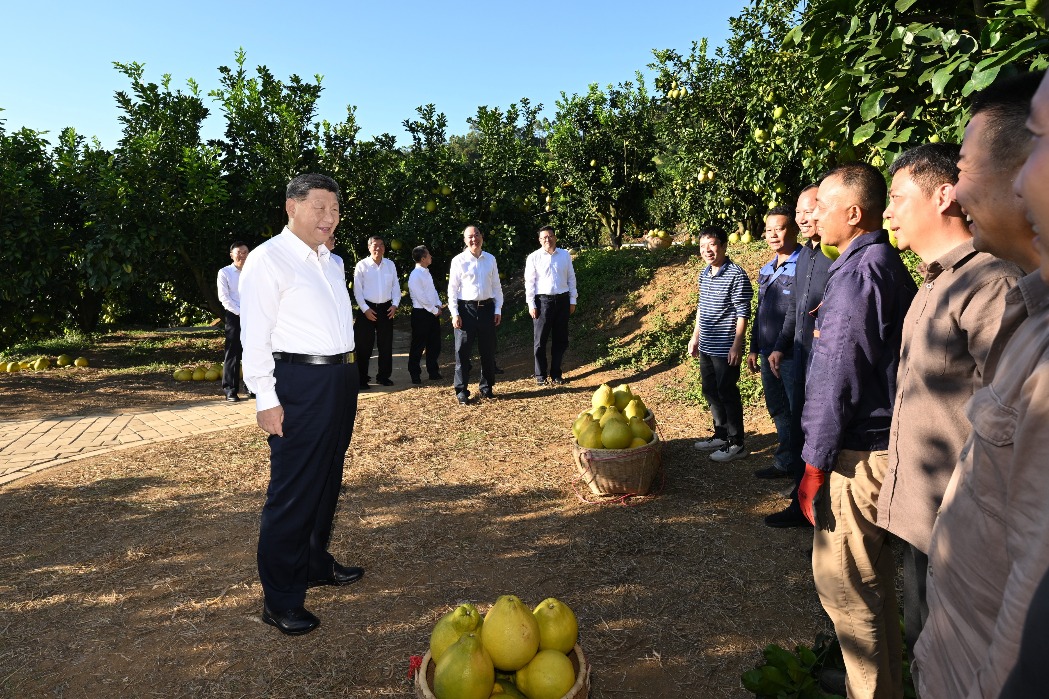Pioneering biomass in large-scale production

| Guangxi Guangwei Chemical Industry Co Ltd has the world's first and largest biomass production line for ethylene and other products. Zhu Lixin / China Daily |
As the world's first and largest company to commercially produce ethylene, vinyl acetate and polyvinyl alcohol from biomass, Guangxi Guangwei Chemical Industry Co Ltd has charted a new course in the industry.
Based in Yizhou city of Southwest China's Guangxi Zhuang autonomous region, the company is the youngest but one of the most important subsidiaries of Anhui Wanwei Group Co Ltd, a major state-owned enterprise producing multiple chemical materials.
The subsidiary originally belonged to Guangxi Vinylon Group Co Ltd, one of nine Chinese vinylon plants - with Anhui Wanwei Group included - built in late 1960s and early 1970s with technology and equipment from Japan.
In August 2008, a serious explosion at the Guangxi chemical company caused dozens of a casualties. The former parent company could not rebuild the plant and operation, so Wanwei Group wanted to give it a bold try.
The new company, wholly owned by Wanwei Group, was officially established on July 1, 2009, after almost half a year's hard work to clear up the ruins left by the explosion. This time the company wants to try a path never taken by its peers - to produce chemical products using biomass.
The company since attracted enormous attention from across the world for both its pioneering development strategy and advanced technology.
As China's largest sugar producing region, Guangxi has abundant biomass including sugar cane, cassava and plant stalks.
Low raw material prices and a full industry chain for sugar were two of the primary reasons Wanwei Group made the decision to acquire the operation, yet pioneering a totally new course requires much more investment than usual.
Sun Xianwu, general manager of the new subsidiary, says the parent company has to invest a total of 1.4 billion yuan ($228 million) in the subsidiary's biomass production lines, but he thinks the investment will turn out to be worthwhile in the future.
China's chemical companies mainly produce ethylene, a basic material used to make various common products. The standard processes use calcium carbide, natural gas or petroleum, but innovation-oriented Wanwei Group plans to initiate a fourth path.
"To have a more sustainable development, we have to diversify our products and differ from other ordinary producers, who make almost the same thing. So we made a blueprint on how to seize the high-end market," Sun says, formerly a senior executive responsible for marketing in the parent company.
"The three traditional ways to produce the products are often connected with high energy consumption and inevitably generate impurities, while high-end products require as few impurities as possible. The biomass method is the most efficient and most environmentally friendly way to produce high-end vinyl acetate and polyvinyl alcohol products."
The system is able to produce almost pure ethylene from sugar. Liquid waste from sugar production can be used to make alcohol, or along with solid waste, used as fuel.
Cooperating with several of China's top universities, the company finished the new production line in December 2012 and began trial production that turned out to be smooth and successful.
The system was formally put into use for five consecutive months starting in March 2013, then the company spent some time to evaluate and improve the system.
After sending samples to potential customers around the world, the company has received many orders, including from world-renowned Kuraray from Japan, Wacker from Germany, and Celanese and Dow from the United States.
In April alone, the company produced more than 3,000 metric tons of ethylene. By the end of June, it had worked for two months to finish current orders from overseas customers, which also come from Europe, Russia, India and Southeast Asia.

"Requirements from our customers are higher than the national standard, yet they are all satisfied with our products so far," Sun says.
Due to the heavy investment, the company was not able to make a profit and still saw a deficit of 110 million yuan in 2013. But in July it reached the break-even point.
"We think the investment is absolutely worthwhile and this is just the beginning of our promising business. By this most advanced approach our company will not only secure a good market share, but also further strengthen Anhui Wanwei group's leadership in the industry."
China aims to drive bio-industries into high-speed growth in the next few years to become one the economy's pillars, according to a development plan released by the State Council at the end of 2012.
The plan pledged to promote biomass use in multiple fields including manufacturing, which is expected to see an annual output value of 750 billion yuan by 2015.
"With rapid development of downstream industries, our company will surely see better opportunities in the future," Sun says.
Contact the writer through zhulixin@chinadaily.com.cn
(China Daily European Weekly 09/26/2014 page23)
Today's Top News
- Xi urges deepening reform, opening-up during Guangdong inspection tour
- China releases white paper on low-carbon development
- What use are the humanities in the age of AI?
- Cameroon president congratulated on re-election
- Xi attends carrier's commissioning
- Drive to be powerhouse in sports championed






























